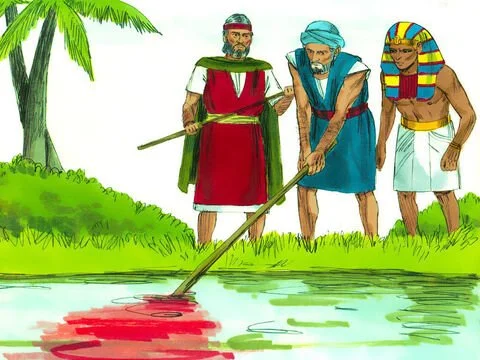Q&A - Demoniac Miracles?
In this blog post, I share an answer to student questions - I have been hosting a live Q&A forum about the Bible for over 10 years at the Israel Institute of Biblical Studies
In Lesson 6 (Bethesda and Rabbinic Literature), there is a reference to Moses' rod as a symbolic instrument of divine power. How can we explain that in Exodus, the magicians of Egypt also performed miracles similar to those performed by Aaron at God's command?
First, regarding Moses' rod, it served as an instrument of divine action mainly in the miraculous episodes before God's personal revelation at Sinai. These episodes are: the 10 utterances, the parting of the Sea of Reeds (in some translations, "Red Sea" – more on this in the Biblical Geography course), the water from the rock at Rephidim, and the Israelites' fight against the Amalekites. After that, some supernatural scenes and events also diminished. Objects in the Bible do not possess intrinsic power, but only when in connection with God or another supernatural source. In the biblical world, the physical world is affected by the actions of supernatural beings. This is where the magicians of Egypt come in.
According to the book of Exodus, four times the magicians of Egypt were able to accomplish something similar to what the God of Israel had done (7:11-12, 22; 8:3). After the serpents, the waters turned to blood, and the frogs, there is a division between the Israelites and the Egyptians. Until then, it seems that the questions reflected the entire land of Egypt (7:20, 21; 8:5, 6, 16). After the third plague, of lice, the magicians were unable to simulate the action of the God of Israel, and from the fourth plague onward, there is a separation between the land of Goshen, where the Israelites lived, and the rest of the land of Egypt (8:22, 23; 9:6, 7, 26; 10:23; 11:7). In the 7th and 10th platforms, regarding the hailstorm and the death of the firstborn, anyone who obeyed Moses' warning would escape destruction (9:19-21; 12:23).
The approaches are the 6th plague (ulcers – "all the land of Egypt" 9:9) and, possibly, the 8th plague, of locusts in the land (10:5 and 6). I say "possibly" because verse 5 says that the locusts destroyed what remained of the land that the hailstorm did not destroy. And according to 9:26, the land of the Israelites was not affected by this plague. Even though the locusts ate the Israelites' crops, this did not affect them in the long term because they soon left the land and did not depend on Egypt for food.
Thus, there is a version in the 10 sentences regarding God's action against the Egyptians. In the first three signs replicated by the magicians of Egypt, the God of Israel does not show Himself superior. The following questions, however, demonstrate not only that the God of Israel is more powerful but also that all Egyptians who believed in Him would be delivered (the 8th and 10th plagues).
So, what is clear from the Exodus narrative is that supernatural forces affect nature, and that the God of Israel is superior to any other supernatural force. Regarding the power of the magicians of Egypt, early interpretations state that the magicians merely created the appearance of serpents with the forces of evil (deception), not a real transformation. The argument for this interpretation is that only God can create, not the forces of evil. But is this true according to the Bible?
Another argument is that the magicians seem to replicate what God had created but failed to remove, the plague seen in Pharaoh's repeated requests to Moses to remove the affliction from Egypt. Both interpretations are speculations that assume the forces of evil are limited by Israel's God. In the next text, I will elaborate on supernatural powers and their influence on the natural world in the Hebrew Bible and the New Testament.

